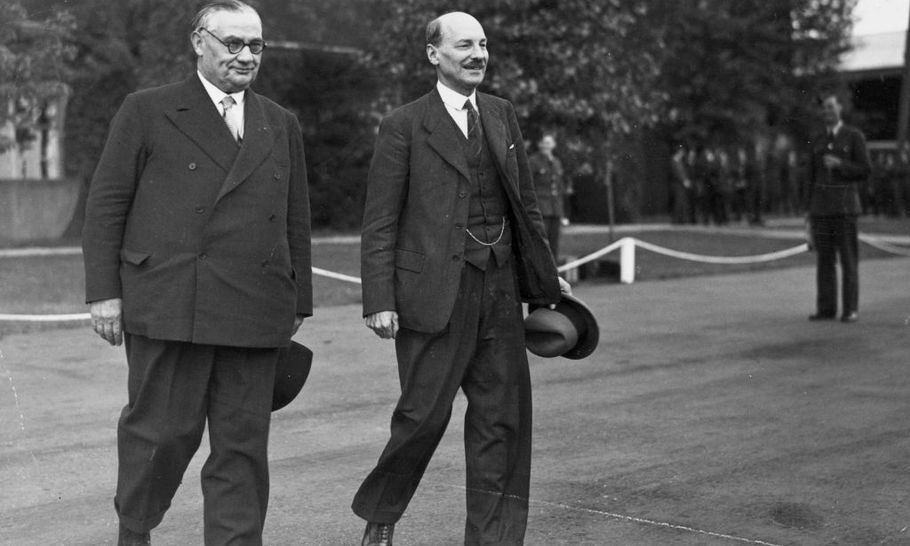What Labour should really learn from its own history

(Photo by J. A. Hampton/Topical Press Agency/Getty Images)
Peter Kellner recently argued in these pages that if Sir Keir Starmer wants to revive Labour’s fortunes, his role model should be Clement Attlee. In contrast, Andrew Adonis in his Bevin, Labour’s Churchill makes the case for Ernest Bevin as a guide to the party’s electoral fortunes (you can read an extract from his book here).
Both writers look back with nostalgia to the 1945 General Election and to the achievements of the 1945-51 Labour government and see their subjects as its architects then, and as guides to future success. Both can be seen as pragmatic moderates promoting centrist policies, though either directly or implicitly they disavow the most recent proponent of such policies, Tony Blair.
But which Attlee and which Bevin are we talking about here? Both men and their achievements can be seen in very different ways, as can the reasons for Labour’s electoral success in 1945 and the nature of the governments they led.
Central to their thesis is that economic and social policy is what decides elections and that the “middle of the road” is the key to power. It follows that the election of 1945 and the relative success of the 1945-50 Labour government is the proof of this proposition — but is it?
Undoubtedly, war-weariness and a wariness of Churchill’s war-like rhetoric played a part. But there was also an element of faith in the idea that Attlee and Bevin would maintain Britain’s position as a world power in economic, military and diplomatic terms. Both Attlee and Bevin did their best to deliver on this. Thanks largely to the two of them, the Labour government was moderate in its socialism, outflanking the left of the party due to Attlee’s tact and skilful manipulation, while Bevin, his “tank”, ensured the acquiescence of the trade unions.
The government’s moderate brand of socialism was made clear in that it took only a limited number of failing industries under state control, while it introduced reforms which consolidated and extended the welfare state — a system which already existed. There was, however, another side to its policies. As David Edgerton has demonstrated in his Rise and Fall of Modern Britain (2018), Labour in power was a patriotic and even a nationalistic government, which was determined to maintain Britain’s international status.
It spent more on “warfare” than the “welfare” state. It was autarchic in its economic policy, ensured that Britain became a nuclear power and, even though it reluctantly recognised the need for the end of the Raj, sought to strengthen the rest of Britain’s Empire. These policies, debit points in Adonis’s view and not mentioned by Kellner, did much to sustain Labour’s popularity until its eventual, very narrow, defeat.
The Kellner/ Adonis analysis assumes that economic and social questions are more important to working-class voters than patriotism and identity. At the last general election, Labour may have lost votes in the south of England because Corbyn’s brand of socialism was too extreme, but, more significantly, it lost favour among working-class voters in northern England because it was perceived as unpatriotic.
Great was the shock to middle class socialists when, on the night of the Brexit Referendum the first city to announce a pro-Brexit majority was Sunderland, just as when, in the election of 2019, Labour’s supposed “red lines” were substantially eroded. The proletariat — if there still was such a thing — had disgraced itself. Yet no one who knew the North-East or had studied its history should have been surprised, for if loyalty is the defining characteristic of the working-class in North-east England, that loyalty has been given, not just to trades unions or the Labour Party, but to regiments, to country, and a broader sense of identity and place.
Kellner is, of course, correct in writing that Attlee’s approach of “building a national consensus and offering competent leadership,” is attractive to voters. But nation is not mentioned as part of this consensus. Adonis has written a most readable biography of Bevin, which rightly praises his subject’s common sense, pragmatism and ability. But Kellner leaves patriotism out of his assessment of Attlee, while Adonis loses patience with Bevin when it comes to the latter’s dislike of moves towards European unity and determination to retain Britain’s status as a great power. Post-Brexit, Labour needs to reassess its attitudes to nation and identity and rekindle the patriotism of its two great past leaders.




